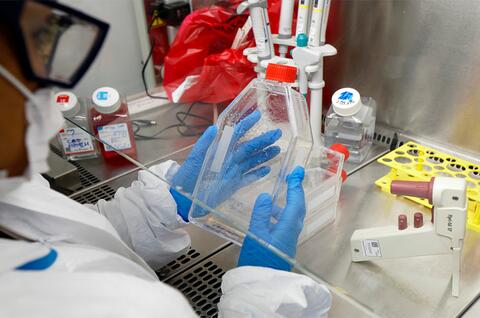
The Cancer University Institut (CUI) receives "Comprehensive Cancer Center" accreditation from the OECI
The OECI (Organisation of European Cancer Institutes) is a European organization that certifies centers of excellence in cancer research, awarding them the Comprehensive Cancer Center label. This label implies the integration within the evaluated structure of cancer care, teaching and research, with structured and dedicated governance aimed at improving performance in these 3 areas. On June 16, at the OECI annual congress in Paris, the label was awarded to the Institut Universitaire de Cancérologie AP-HP Sorbonne Université.
Joseph Gligorov, Director of the CUI, answers questions from the Sorbonne University Faculty of Medicine Communications Department.

Could you describe the CUI's role within the university and its main activities?
Joseph Gligorov: The Institut Universitaire de Cancérologie was set up just over ten years ago by Dean Serge Uzan, initially with the aim of bringing together the various forces at our university involved in cancer research and teaching, in collaboration with the various Inserm and CNRS teams. The first step was clearly to build and strengthen existing links between the various clinical and fundamental research teams. At the same time, a doctoral program in oncology was set up with the support of the university, which financed two dedicated doctoral grants. This first step has enabled us to take stock of our many strengths in very different but complementary fields, and to build our ambitions so as to give ourselves the means to become, beyond our name, a genuine cancer center within our university. This has enabled us to respond to a number of national and international calls for projects, such as CLIP2 (Certified Early Stage Center) and SIRIC (Integrated Cancer Research Site, not to mention the numerous accreditations we have received as reference centers for rare cancers or cancers associated with particular clinical situations. The second stage involved the integration of care activities in terms of coordination by the IUC, which coincided with the creation of the AP-HP Sorbonne Université GHU, hence the name AP-HP Sorbonne Université IUC. It was at this point that the governance took on the more global coordination of care, teaching and research, under the mission of the Dean of the Faculty of Medicine, Prof. Bruno Riou, and the Director of the GHU, Ms. Christine Welty. The care coordination activity or 3C (Cancer Coordination Centrer ) piloted by Diaretou N'Diaye Gueye and the GHU's care quality teams aimed to support institutional cancer care obligations and the objectives set by INCa. The strategic orientation committee then decided to set in motion the process of evaluating our center in order to obtain the "Comprehensive Cancer Center" label.
Who does the OECI award this label to? Are there many of you?
Joseph Gligorov: Thirty-two structures in Europe and the rest of the world currently hold this label. In France, there are currently 8 accredited centers, and only 2 within GHUs: Cancer Institute Carpem and CUI AP-HP Sorbonne Université. In all, there are only 8 university hospitals in Europe with Comprehensive Cancer Center accreditation.
What will this labeling bring to theCUI?
Joseph Gligorov: First and foremost, this label is the culmination of two years' work involving numerous teams from Sorbonne University, Inserm, CNRS and the GHU's clinical teams. This work consisted not only in taking stock of our strengths, but also in building our future ambitions.
This label is also a mark of recognition of our investment in the fight against cancer in all its dimensions, not only nationally but also internationally.
Last but not least, this label is also one of the tools recognized by the European Commission for the evaluation of centers of excellence in the fight against cancer, which opens the door to new calls for collaborative, international projects with high added value for our university and our GHU.
What are the next steps?
Joseph Gligorov: This certification is not definitive, and as with any quality initiative, it will be reviewed in 5 years' time to assess the progress of our projects and whether they are in line with our strategic plan.
At the next meeting of the Strategic Orientation Council in September, the various teams involved will be briefed on the conclusions of the OECI auditors and the opportunities for development and improvement identified.
What are your projects?
Joseph Gligorov: On the research front, we want to strengthen collaboration between basic and clinical research structures. Following the renewal of the SIRIC, we have to respond to the call for projects for the renewal of CLIP2. We have also identified the possibility of increasing patient recruitment in innovative trials, thanks to the steering of a research group that includes not only clinicians but also more fundamental researchers.
In terms of teaching, the range of training courses offered in the field of oncology now includes a very broad spectrum, from training for patients with the Université des Patients, to training for caregivers, in particular new care professions such as Advanced Practice Nurses, as well as a specific oncology teaching program within the doctoral program.
In the field of care, structuring patient pathways around quality and access to innovation is our priority objective.
All in all, after only 10 years in existence, this label once again testifies to our university's considerable assets and strengths in the fight against cancer, as well as to the responsiveness of all these players in building common objectives.
